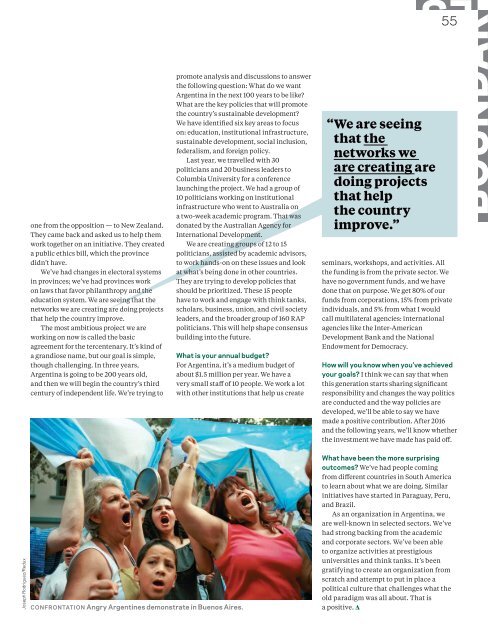Magazine_blue_green
Create successful ePaper yourself
Turn your PDF publications into a flip-book with our unique Google optimized e-Paper software.
one from the opposition — to New Zealand.<br />
They came back and asked us to help them<br />
work together on an initiative. They created<br />
a public ethics bill, which the province<br />
didn’t have.<br />
We’ve had changes in electoral systems<br />
in provinces; we’ve had provinces work<br />
on laws that favor philanthropy and the<br />
education system. We are seeing that the<br />
networks we are creating are doing projects<br />
that help the country improve.<br />
The most ambitious project we are<br />
working on now is called the basic<br />
agreement for the tercentenary. It’s kind of<br />
a grandiose name, but our goal is simple,<br />
though challenging. In three years,<br />
Argentina is going to be 200 years old,<br />
and then we will begin the country’s third<br />
century of independent life. We’re trying to<br />
promote analysis and discussions to answer<br />
the following question: What do we want<br />
Argentina in the next 100 years to be like?<br />
What are the key policies that will promote<br />
the country’s sustainable development?<br />
We have identified six key areas to focus<br />
on: education, institutional infrastructure,<br />
sustainable development, social inclusion,<br />
federalism, and foreign policy.<br />
Last year, we travelled with 30<br />
politicians and 20 business leaders to<br />
Columbia University for a conference<br />
launching the project. We had a group of<br />
10 politicians working on institutional<br />
infrastructure who went to Australia on<br />
a two-week academic program. That was<br />
donated by the Australian Agency for<br />
International Development.<br />
We are creating groups of 12 to 15<br />
politicians, assisted by academic advisors,<br />
to work hands-on on these issues and look<br />
at what’s being done in other countries.<br />
They are trying to develop policies that<br />
should be prioritized. These 15 people<br />
have to work and engage with think tanks,<br />
scholars, business, union, and civil society<br />
leaders, and the broader group of 160 RAP<br />
politicians. This will help shape consensus<br />
building into the future.<br />
What is your annual budget?<br />
For Argentina, it’s a medium budget of<br />
about $1.5 million per year. We have a<br />
very small staff of 10 people. We work a lot<br />
with other institutions that help us create<br />
“ We are seeing<br />
that the<br />
networks we<br />
are creating are<br />
doing projects<br />
that help<br />
the country<br />
improve.”<br />
55<br />
seminars, workshops, and activities. All<br />
the funding is from the private sector. We<br />
have no government funds, and we have<br />
done that on purpose. We get 80% of our<br />
funds from corporations, 15% from private<br />
individuals, and 5% from what I would<br />
call multilateral agencies: international<br />
agencies like the Inter-American<br />
Development Bank and the National<br />
Endowment for Democracy.<br />
How will you know when you’ve achieved<br />
your goals? I think we can say that when<br />
this generation starts sharing significant<br />
responsibility and changes the way politics<br />
are conducted and the way policies are<br />
developed, we’ll be able to say we have<br />
made a positive contribution. After 2016<br />
and the following years, we’ll know whether<br />
the investment we have made has paid off.<br />
BOUNDARIE<br />
IES<br />
Joseph Rodriguez/Redux<br />
CONFRONTATION Angry Argentines demonstrate in Buenos Aires.<br />
What have been the more surprising<br />
outcomes? We’ve had people coming<br />
from different countries in South America<br />
to learn about what we are doing. Similar<br />
initiatives have started in Paraguay, Peru,<br />
and Brazil.<br />
As an organization in Argentina, we<br />
are well-known in selected sectors. We’ve<br />
had strong backing from the academic<br />
and corporate sectors. We’ve been able<br />
to organize activities at prestigious<br />
universities and think tanks. It’s been<br />
gratifying to create an organization from<br />
scratch and attempt to put in place a<br />
political culture that challenges what the<br />
old paradigm was all about. That is<br />
a positive. Δ


